After traveling to Antarctica as part of National Geographic’s Grosvenor Teacher Fellows program, Vickie Obenchain '03 hopes her journey will inspire her students to follow their own dreams.
Powered by RedCircle
Vickie Obenchain would do anything to encourage her students to make their dreams a reality.
When several students told her they wanted to be pilots, she went to air camp over the summer and learned how to fly a plane.
When she told her class she was selected for an expedition to Antarctica, most of her students said they would jump into the water there if they were given the same opportunity, so she plunged into the frigid Southern Ocean. If she can do these things, she reasons, then her students will see that they can, too.
“My goal is for my kids to realize that they can do the things they want to do,” Obenchain says. “If I can inspire any of them to follow their dreams, that’s really important to me. I want to be a role model for them to take the risks that are out there.”
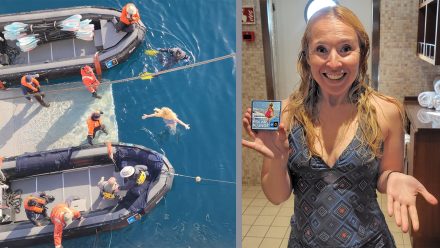
Obenchain’s expedition to Antarctica was part of her recent experience as a Grosvenor Teacher Fellow, a professional development opportunity for pre-K–12 educators made possible by a partnership between Lindblad Expeditions and the National Geographic Society. Obtaining the fellowship was a long-term goal of her own that she made a reality through persistence and hard work. She spent two weeks exploring Antarctica’s ecology firsthand and brainstorming ways to bring that dynamic experience back to her classroom.
“I want to highlight things we think we know and show my students that there’s so much more,” Obenchain says. “I want to inspire the kids to wonder and explore on their own, to make them want to admire and appreciate the world around them.”
* * *
Obenchain’s passion for environmental science stems back to the places she visited and lived as a child. When she was growing up in Idaho, her family took a two-week road trip every summer to see national parks and other stunning landscapes throughout the United States. When the family moved to Maryland, they lived along the Chesapeake Bay.
“When it was time to figure out what I was passionate about pursuing, it was being outside and wanting to protect those areas,” Obenchain says. “Trying to understand the impact of humans living around such beautiful areas was always of interest to me.”
When counselors from Elon visited her high school in Maryland and she learned the university had an environmental science program that aligned with her interests, she applied early decision and never looked back. She joined the Sierra Club, took two Winter Term study abroad courses — including a field ecology course in Belize — and immersed herself in classes such as organic chemistry, ecology and environmental chemistry.
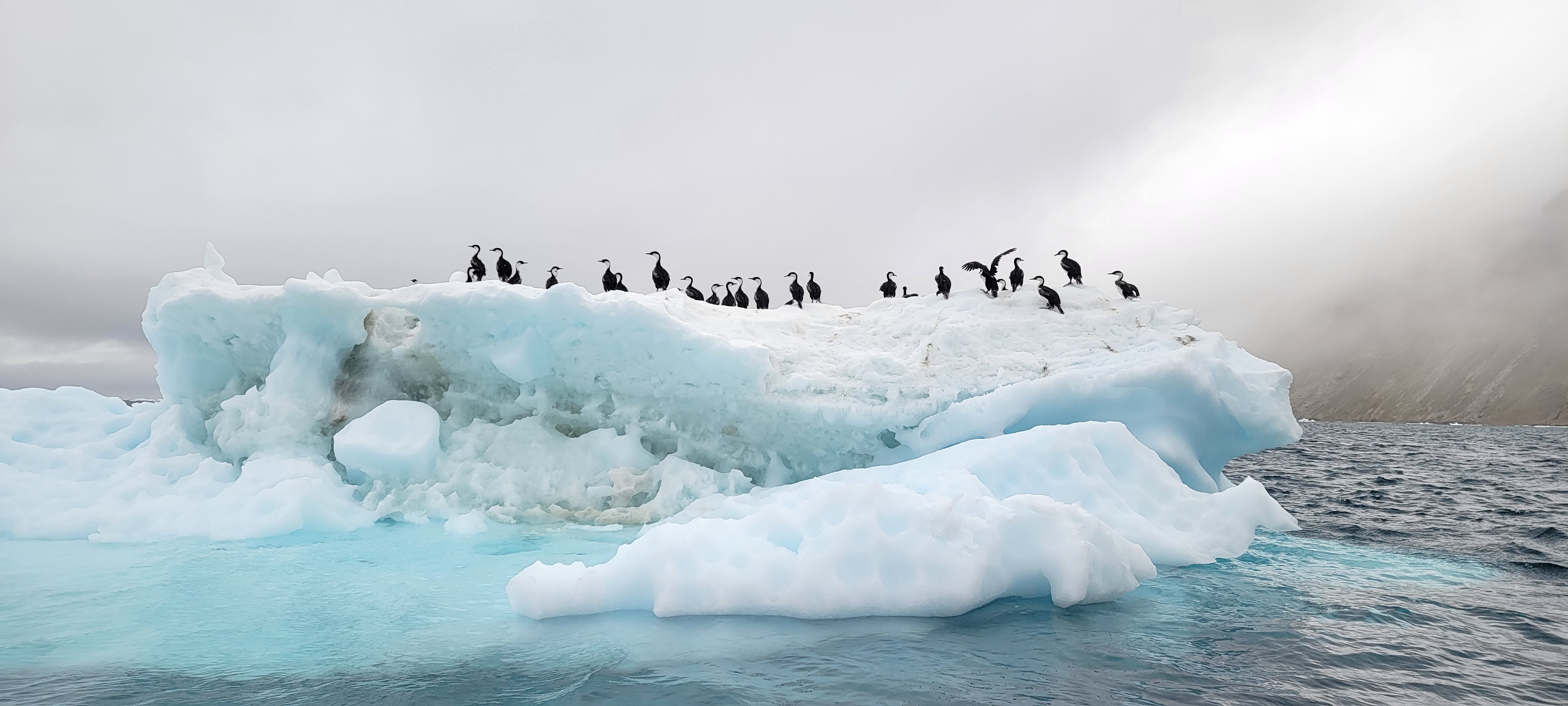
Elon also unlocked a new passion for Obenchain. She fell in love with teaching when she became a teaching assistant for an Intro to Environmental Science lab and continued to cultivate those skills teaching science as a camp counselor and during an internship at an outdoor center in Greensboro, North Carolina. It was too late in her college career to add a second major, but she still took some teaching classes to gain more experience. After teaching outdoor education in one of California’s redwood forests for two years, Obenchain obtained a master’s degree in environmental education from Montclair State University with the goal of opening her own environmental education center.
“When I was doing my degree, I realized that if I wanted to open my own environmental education center, I needed to know what teachers wanted, so I decided to go into the classroom for two years,” she says. “But then I fell in love with my students and now I’ve been there for 15 years. I can’t imagine doing anything different.”
Obenchain is a full-time science teacher for sixth, seventh and eighth grade students at The Saklan School, an independent pre-K through eighth grade school in Moraga, California. She also teaches one unit a year to kindergarten through fifth grade students as a STEM specialist. She learned about the Grosvenor Teacher Fellowship after taking several online courses from National Geographic, including its educator certification program.
“It was so meaningful because it was about how to make your students really buy into learning and being their own explorer, even from their classroom or backyard,” Obenchain says. “A lot of teachers do that, but National Geographic puts words to it, and they help you build a framework for your classroom that goes a little deeper and empowers the kids to learn more.”
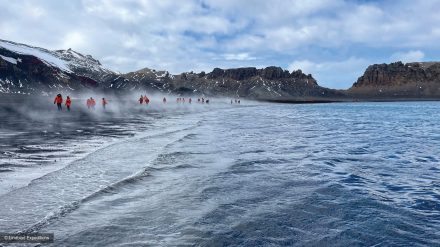
The Grosvenor Teacher Fellowship selects exemplary educators to embark on a life-changing voyage to one of the many remote and extraordinary environments the Lindblad fleet explores around the world. During field-based experiences in places such as the high Arctic, southeast Alaska, Central America, Antarctica or the Galápagos Islands, the educators encounter wildlife and explore terrain with a team of naturalists, including marine biologists, geologists, historians and National Geographic photographers. They return to their classrooms with “an experience they will translate into reimagined curricula that inspire their students, colleagues and communities to care more deeply about the planet and take action on global issues,” according to National Geographic.
After returning from their expeditions, the Grosvenor Fellows engage in leadership opportunities with National Geographic for two years. The highly competitive fellowship attracts anywhere from 600 to 1,000 applicants a year for only 50 spots. Obenchain applied three times and was elated when she was accepted in February 2020. “They actually called my school,” she says. “I got called to the office and I was so confused. Then of course they tell me and I’m crying in the office. It was a really cool experience to be selected. Then COVID hit.”
* * *
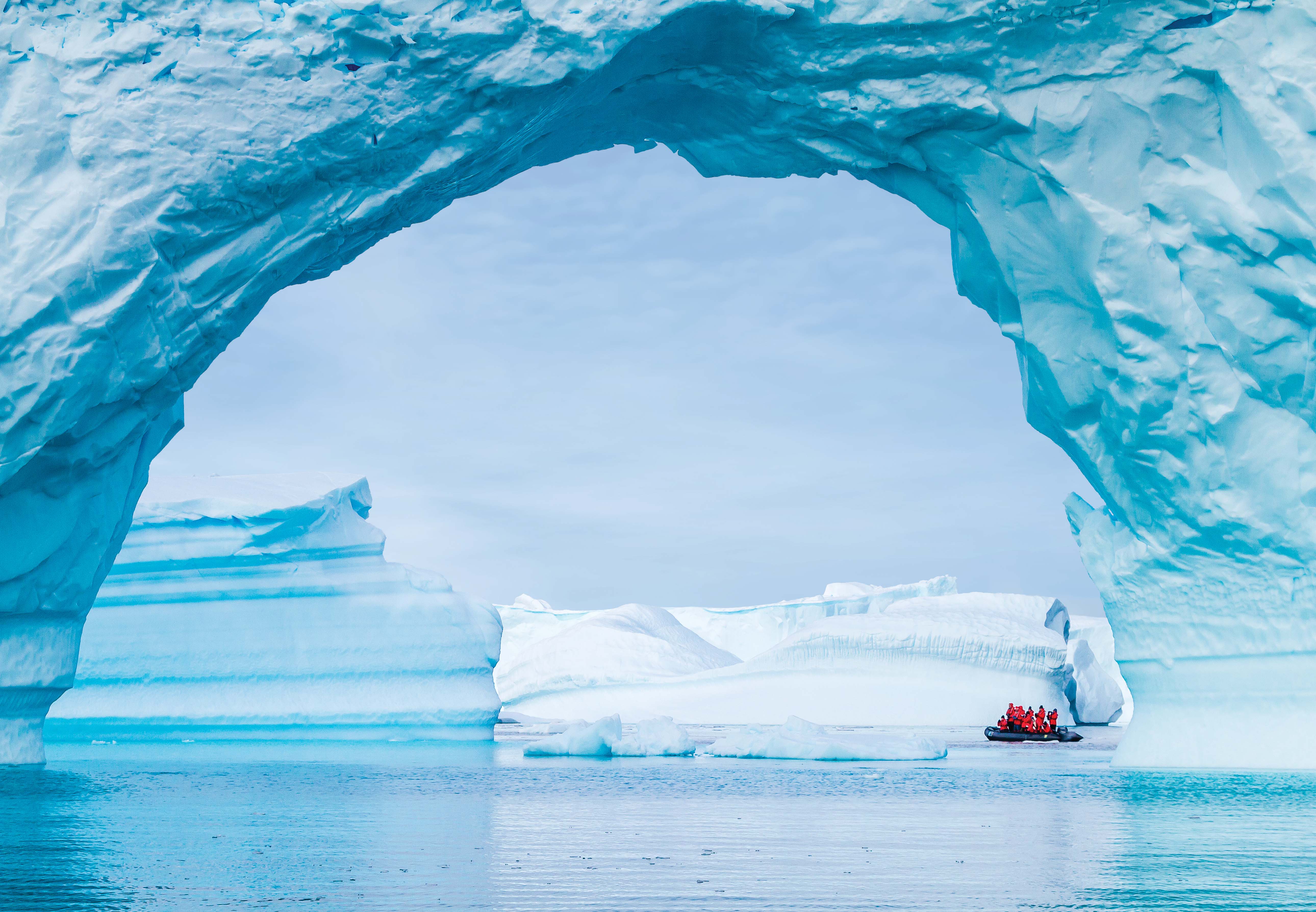
When Obenchain was first awarded the fellowship, she was told she would travel to Antarctica in November 2020. National Geographic postponed the voyages several times as the pandemic stretched on, and Obenchain worried they would be canceled altogether for her cohort of Grosvenor Fellows. Finally, in fall 2021, National Geographic announced the fellows would receive new placements and travel would resume. Obenchain was thrilled to be assigned to Antarctica once again, along with two other fellows. They departed for their two-week expedition in December 2022.
Obenchain and the other fellows heard daily presentations from the naturalists on board about their various areas of expertise, from Antarctica’s geography and geology to specific animal populations such as penguins and krill. Once or twice a day, they left the ship to explore the things they learned about in the presentations firsthand.
“We walked one day on an active volcano site where the ground was actually steaming,” Obenchain says. “We spent a lot of time observing penguins. We went out in Zodiac boats a few times around different ice floes and whales would be breaching right in front of you, penguins swimming around you. On top of the ice there would be humongous seals sleeping. Every day was something different and beautiful.”
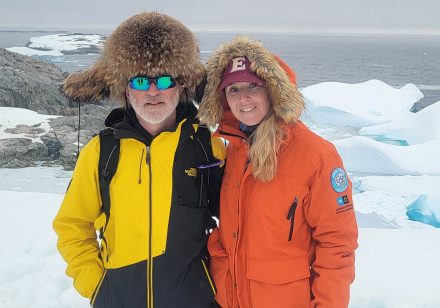
One of the naturalists happened to be Tim Martin, an instructor in physics at Elon who immediately bonded with Obenchain over their shared connection to the university. Martin was a Grosvenor Fellow himself in 2016 before joining Elon’s faculty and still draws on his experience from his own expedition to Iceland in his teaching today. He now frequently works with Lindblad as a naturalist specializing in earth science and geology, and he always makes a point to support Grosvenor Fellows when they’re on board.
“It’s very clear that Vickie has a really dynamic passion for what she does,” Martin says. “The Grosvenor Fellowship is a really big feather in her cap. As an educator who received the grant myself, I know there is a special magic that gets associated with that little yellow rectangle. When people see that you’ve been recognized as a great teacher by National Geographic, that’s significant.”
Obenchain made sure her students were active participants in her fellowship experience from the start. She documented her expedition on Instagram so her students could follow along and submit questions for her to ask the naturalists. Seeing her students’ excitement fueled ideas about how she could connect her Antarctic experience back to the classroom. Obenchain’s students are particularly interested in climate change, so she collected information about glacier melt and other effects on Antarctica’s ecology. She teaches a unit on birds in seventh grade biology, so she plans to highlight the unique attributes of penguin species that she observed. She left the expedition with a new appreciation for krill and wants to educate her students about the crucial role these small crustaceans play in the survival of Antarctic animals and the threat that climate change and overfishing poses to them.
“I want my students to go after the things they want in this world and realize they have every possibility of getting those things. It takes hard work and passion, but I want them to do it.”
In Martin’s experience, students find science more meaningful when teachers can share direct, detailed knowledge that brings the subject to life. “When a student can say, ‘Wow, my teacher was just walking around on a volcano in Antarctica,’ all of a sudden that teacher is more than just somebody who’s trying to make them learn something,” he says. “They’re dynamic; they’re cool; they’ve done these really amazing things. It makes geography more meaningful. It makes climate change more meaningful. It makes those things come to life.”
In addition to adding a compelling new layer to her teaching, Obenchain hopes her Antarctic journey will spark her students’ curiosity and compel them to pursue their own dreams. “I want them to follow their passions. I want to show them that if you do, you can achieve your goals, even if it means me jumping in the water in Antarctica so they can say, ‘My teacher did this so I can do it,’” she says. “I want my students to go after the things they want in this world and realize they have every possibility of getting those things. It takes hard work and passion, but I want them to do it.”



